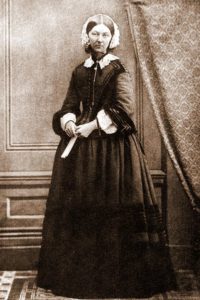Florence Nightingale, the Italian born British pioneer of nursing, and hospital reformer, is considered as the founder of modern trained nursing. Her efforts during the 19th century changed the attitude of society towards nursing and made it a noble profession.
She was born in Florence, Italy on May 12 1820, to a wealthy English family and was named after the city of birth, as her parents were on a vacation in Italy, while Florence was born. From a young age, she was strongly opposed to the pleasure loving social manners of her upper-class society. By the time she reached 17, there was a resilient urge in her to do something more worthwhile with her life, than enjoying the leisured lifestyle of an English upper-class lady.
A decision, which was socially unacceptable for a women of her status
Young Florence decided to take up nursing as a career. She met up strong opposition from her parents, as nursing as a profession was frowned upon by the society during that time period. It was an undisciplined occupation that was shunned by ladies of her class. Moreover professional training for nurses was lacking during that time and the general conditions in hospitals were outright filthy.
At that time, even medical knowledge was in a crude stage as there were no antibiotics, and surgery was performed in primitive ways, which resulted in high mortality rate among hospitalized patients. These technical and social obstacles were not strong enough to shake the conviction of young Florence. She persisted with her decision to dedicate her life to nursing and in 1853 became the superintendent at the Institute for the Care of Sick Gentlewomen, a hospital in London for women.
The emergence of the Lady with the Lamp
With the beginning of the Crimean War – a military conflict between the Russians and the British, French, and Ottoman Turkish -, in 1854, Florence Nightingale wanted to volunteer herself as a nurse to take care the wounded soldiers in the conflict. She persuaded Sidney Herbert, who was the Secretary of War and a lifelong friend, to allow her to lead a team of nurses to the seriously bad military hospital in Scutari – modern-day Üsküdar municipality in Istanbul Turkey – to minister the British causalities of war.

After overcoming much administrative difficulties, she was given permission and she left with 38 other nurses in October 1854 for the voluntary mission. She stayed there till the end of war in 1856. When she arrived in Scutari, the conditions at the hospital were outright miserable. There was no proper medical care or nursing care and the patient’s quarters were infected with rats and fleas.
Florence along with her team cleaned up the hospital and struggled to equip the wards with basic supplies like medical equipment, medical supplies and clean bed for patients. She improved the food for the patients and ensured that proper nursing was always available. When met with difficulty in procuring the necessary supplies, she used her own finances to make the required purchases. Her spirited involvement in Scutari vastly changed the hygiene and overall conditions of the hospital and helped to bring down the mortality rate from a staggering 42% to 2%.
Florence took a personal interest in her patients, and she used to devote many hours in the ward among mortally injured soldiers. Her routine of making night rounds in the wards with a lamp to see that all the injured are comfortable and free of pain made her a Victorian cultural icon. She became the ‘Lady with the Lamp’, who gave personal care to the wounded and was celebrated as a hero on her return to Britain after the war.
After the Crimean War
After her return from the Crimean War, Florence pressed rigorously for reforms in civil and military nursing. Her efforts started to play an important role in vastly improving the health and welfare of soldiers and in raising the prestige of nursing in the society. In 1860, she established the Nightingale Training School for training nurses at the St. Thomas hospital in London.
The first batch of the one year long course had 15 nursing students, who trained at the hospital by residing there under the supervision of a head matron. They used the Notes on Nursing by Florence Nightingale published in 1859 as the text book, and were given instructions in basic sciences by the medical staff of the hospital. They were trained in nursing techniques in the ward of the hospital. This was the first scientifically based nursing school, which was instrumental in setting up training for midwives and nurses and for reforming the nursing field.
She was awarded with the Order of Merit in 1907, becoming the first woman to receive this award. Florence Nightingale, a visionary who set new standards to nursing, passed away on August 13, 1910 at the age of 90 at London, England. Every year, 12 May, the anniversary of her birth, is celebrated as the International Nurses Day.
Cover Photo: Cartoon Vectors by Vecteezy






